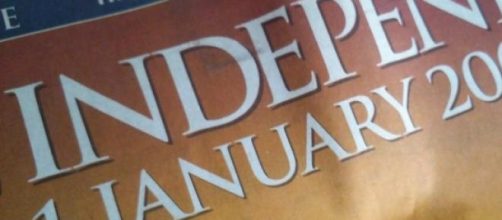Walking off the new millennium hangover on 1 January 2000, I grabbed a copy of the UK's The Independent newspaper. Unread, it found its way to a bookshelf where it sat for fifteen years. Time to dust it off…
Think back to that first day, a Saturday. Adverts tempted you with clunky beige Windows 98 PCs with a whopping 64mb of RAM for £1172 (assuming the Millennium Bug didn't fry it). The London Eye was built but not actually working. The Dome opened its doors to an underwhelmed public. And the prediction game got off to a shaky start with nobody predicting the resignation of Russia's President Yeltsin only hours before.
In the pages of The Indy, Hamish McRae looked to the pending economic issues of the new era. A population boom was on its way and this, according to McRae, did not mean the end of humanity, but rather a rethinking of how the world works. McRae's numbers are pretty much on the ball; he predicts a world population of 8 billion by 2025 which still tallies with current UN estimates. An issue for McRae is getting sufficient food stocks to the right places. More an issues of logistics than actual supply. In 2012 the UN estimated that one in eight of the world's population still suffer from chronic undernourishment.
McRae also picks up on the West's aging population and the shift in economic power to China and India.
In the period since China has averaged real growth in excess of 10 percent. And even though Indian growth hit a rough patch in 2013-14, it too has had a period of outstanding growth and is expected to quickly recover from its current dip. The UK has averaged just under 2 percent growth for the same period.
Perhaps McRae was looking too far ahead; he missed the dotcom collapse that was only months away, and the recession that followed two years later. But he does love his tech and predicts the 'Net' will reach maturity by 2020 and that we'll all be wearing equipment that monitors our health and transmits it directly to our family doctor. Smartwatches, anybody? McRae also foresees the Internet of Things, with scoffing remarks about the need for remote control microwaves.
All the pundits in The Indy start off their articles with excuses; get out clauses for their thankless column. David Aaronovitch keeps his tongue firmly in cheek for much of his contribution. But perhaps some people didn't get his social satire? Aaronovitch's suggestion of a north-south wall was turned on its head in 2008 when the Policy Exchange think tank suggested the closure of cities in northern England and moving the population south for a better standard of living.
Looking to politics, Aaronovitch jokes that we would have our first plebiscite government by 2010. From the increasing number of referendums put before the electorate and devolved power, he might well be closer to the mark than he thought.
He does get serious at times and predicts that governments will need to increasingly regulate against monopolies and abuse of power. We have lost this one. The 2014 global markets (and the Internet) trump our elected politicians at every turn. Tax havens mean that the big players now choose how much tax to pay. I wonder if our consumer era means that we now care more about keeping our iTunes library than keeping our democracy. Back in his article, Hamish McRae predicts as much resistance to globalisation as, the then current, celebration of it. As 2015 dawns, the rise of nationalist political parties such as the SNP and UKIP are as much of this predicted backlash as the Occupy movement. Polar opposites having more in common than they might care to admit.
The Indy's first edition of the millennium takes us back to a bygone era. Nostalgia begins to creep in as we read of a UK with affordable housing and VHS video recorders. An era when dial up Internet was still seen as a great tool that was going to unleash the potential of humanity, not the consumer / entertainment portal it has become. An era when we looked at entertainers as old friends, not old pervs. An era when phones were not smart, when privacy still existed. YouTube and social media are five years in the future.

